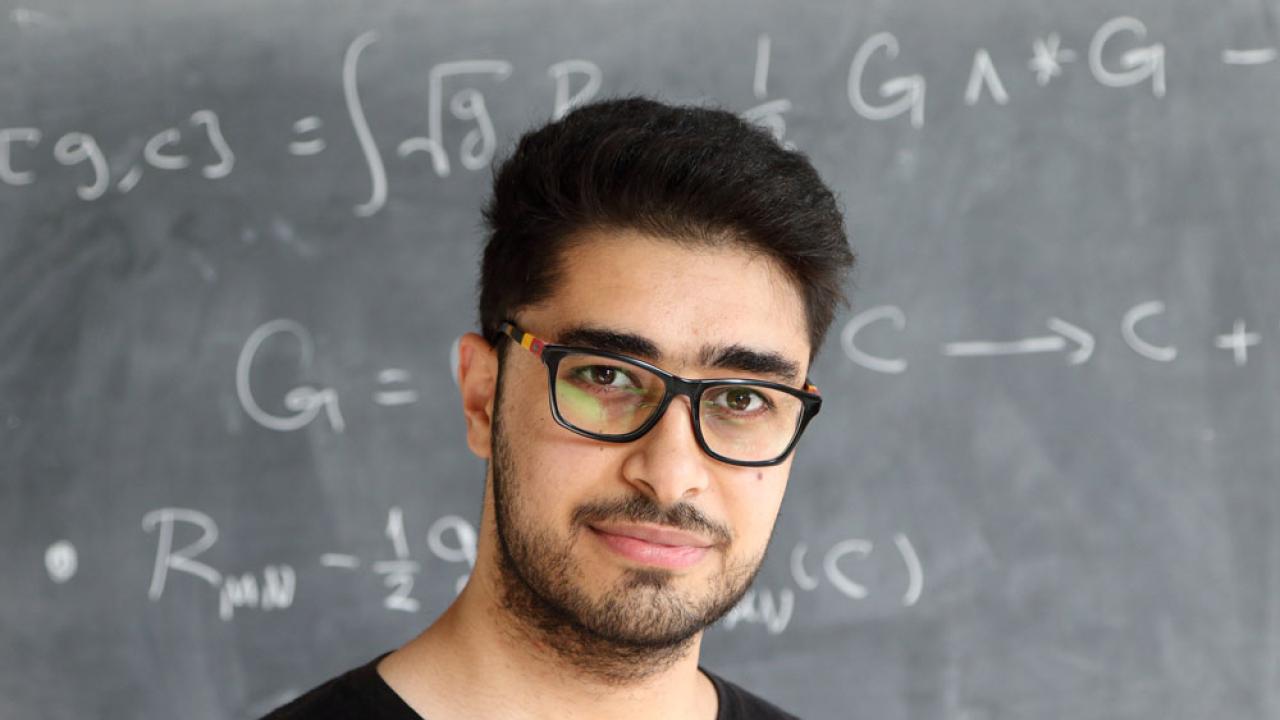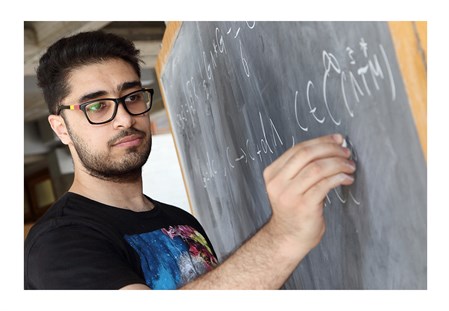
"I've dreamed of getting a physics PhD for a long time," says Marwan Najjar, a Palestinian student who graduated from ICTP’s Postgraduate Diploma Program this past August as part of the class of 2017. That accomplishment is the capstone to a string of chance encounters with ICTP that have helped Najjar’s dream come into sharper focus. "You hear about Einstein and Feynman and know you'd like to be like them, but it's hard to know how to do that." Thanks to ICTP, Najjar now has the knowledge and the opportunities to follow in the path of his idols.
Najjar hails from the West Bank territories of Palestine and studied at Birzeit University, where he earned a master’s degree in general physics. It was here that Najjar first encountered the long reach of ICTP: one of his instructors was ICTP Associate Wafaa Khater, who teaches theoretical particle physics. Then, in 2013, Najjar attended a master class in particle physics organized by the Center’s Physics Without Frontiers program. Two years later, Najjar enrolled in a course at Birzeit University on the Standard Model, taught by ICTP's Bobby Acharya. "I really liked the well-designed syllabus and the intellectual communication that he and the ICTP have created. As a result, I did a lot of research about the ICTP Diploma program and Italy. That’s how I came here,” says Marwan, smiling.
 Acharya’s course helped draw Najjar to theoretical physics, as well. "Building models and theories is the job of theoreticians," says Najjar. "Experimentalists can analyze the functioning of a model, but a theoretician can use just a pen and paper to understand whole of reality around them." Acharya was Najjar's advisor for his Diploma thesis, and will continue in that role when Najjar commences his physics studies as a doctoral student at Kings College London. The two were working on an aspect of M-theory, a theory that unites all aspects of string theory. Najjar's thesis, M-Theory Compactification on a Smooth G2-Manifold, investigates how the extra 7 dimensions that M-Theory uses to explain our 4 dimensional world are shaped into the aforementioned manifold. "It's the first step for the work I'll be doing for my PhD with Bobby," says Najjar.
Acharya’s course helped draw Najjar to theoretical physics, as well. "Building models and theories is the job of theoreticians," says Najjar. "Experimentalists can analyze the functioning of a model, but a theoretician can use just a pen and paper to understand whole of reality around them." Acharya was Najjar's advisor for his Diploma thesis, and will continue in that role when Najjar commences his physics studies as a doctoral student at Kings College London. The two were working on an aspect of M-theory, a theory that unites all aspects of string theory. Najjar's thesis, M-Theory Compactification on a Smooth G2-Manifold, investigates how the extra 7 dimensions that M-Theory uses to explain our 4 dimensional world are shaped into the aforementioned manifold. "It's the first step for the work I'll be doing for my PhD with Bobby," says Najjar.
The challenges to research and education in the West Bank territories of Palestine are numerous, including restriction of movement, low economic development and a lack of connectivity and internet access. Despite these, Najjar would love to earn a professorship at Birzeit University after he finishes his education. "I'm like a fish returning to water, the goal has always been to go back to Palestine," Najjar says. Najjar's family is very excited for him, even as they are spread out across around the world. "My father couldn't complete his studies because of the occupation and politics," Najjar explains. His father left to work in the U.S. to provide for his family, and now his brother and father live in Miami, with his mother in Palestine. "I would love to build a life at home, and be able to see my family all at the same place," he says. Najjar points out that as a theoretical researcher, you do not have to be present for calculations to be run on core computational facilities. "You can do a lot of work at home and travel one or two months out of the year."
Najjar is hopeful and upbeat about the long road towards his own professorship. "Right now, my biggest challenge is passing the English exam for King's College," he smiles. "I'll never forget my life and the conditions in Palestine,” he says. “We need Palestinian students to go into research at the cutting edge,” he explains, “not just to study classical physics. This is a very crucial point to me because knowledge is power. It is like having power in your hands.”
---- Kelsey Calhoun
















